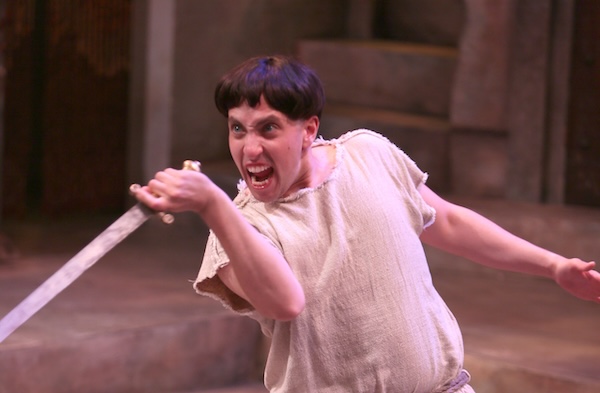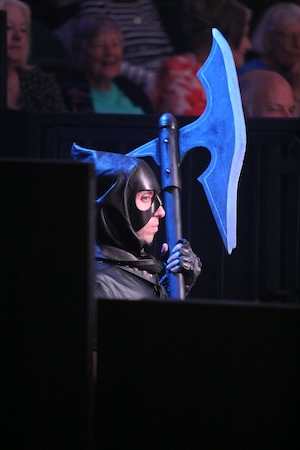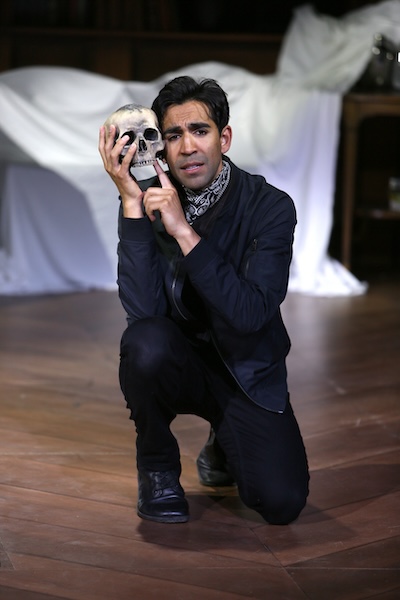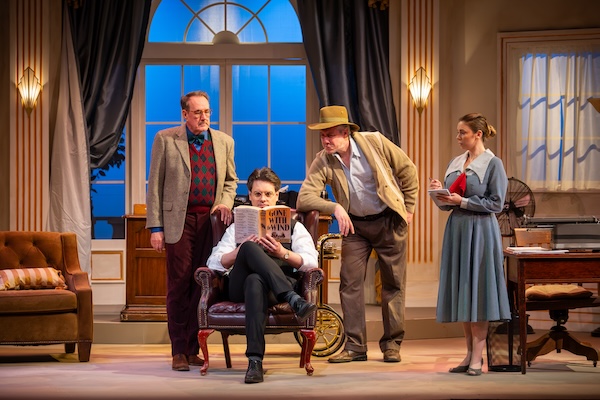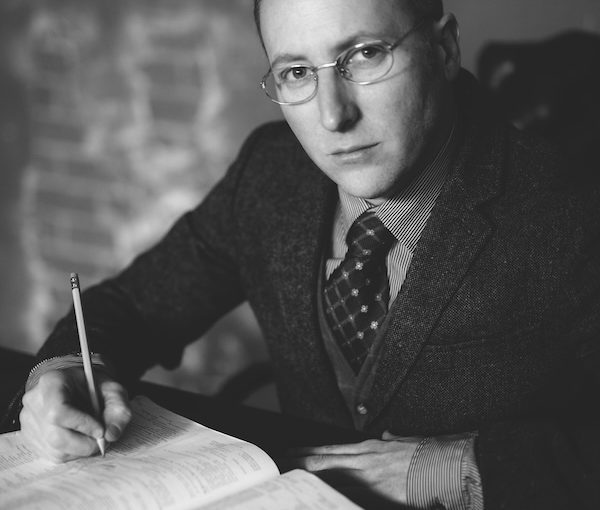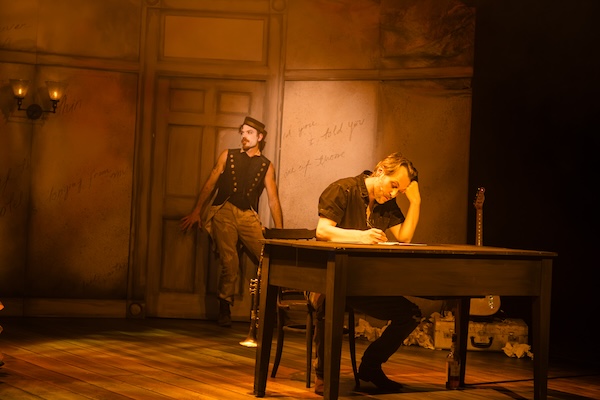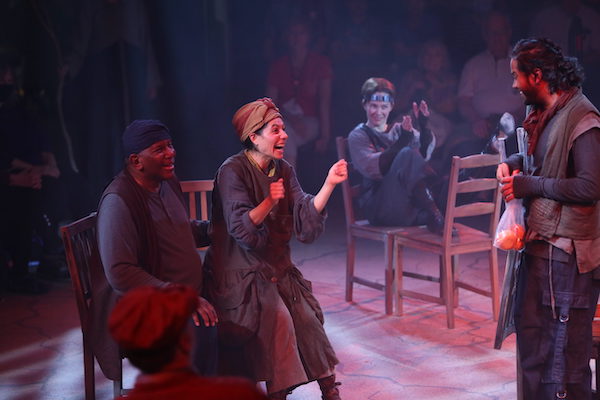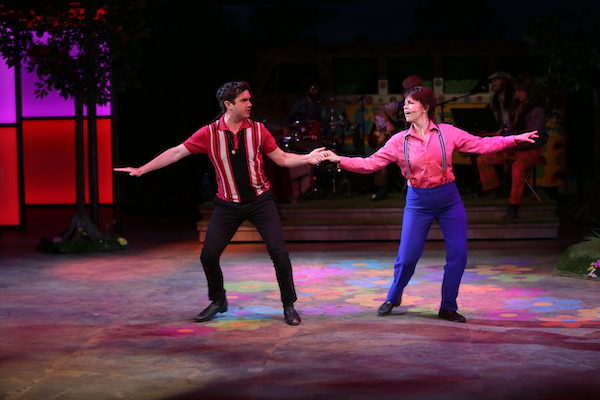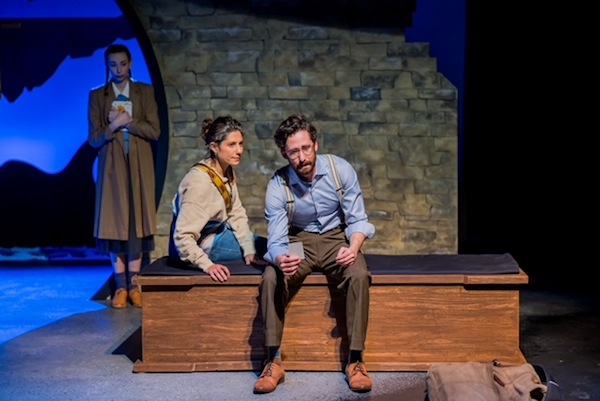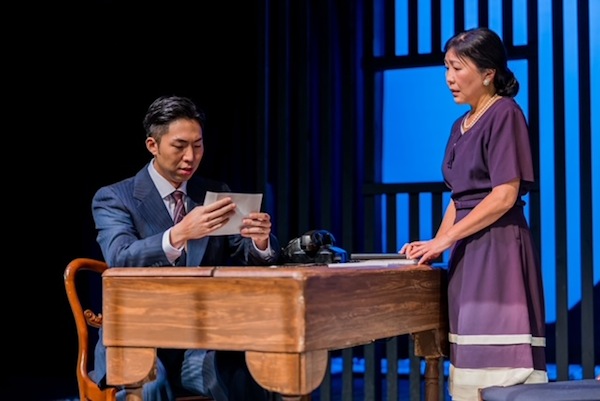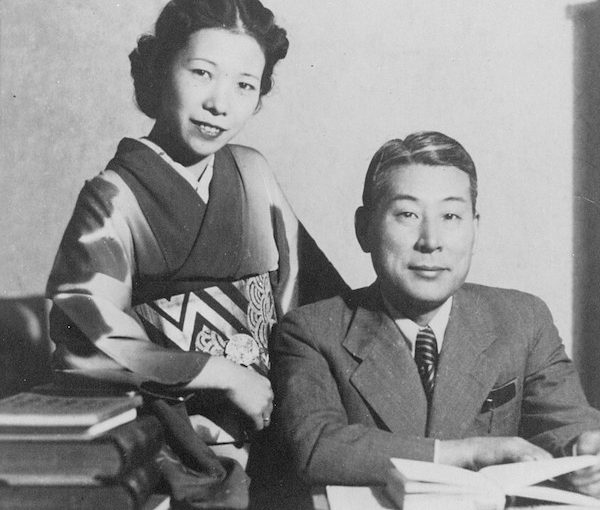Anthony Santiago, at front, plays Fagin in Gateway Theatre’s production of Oliver!, which runs until Jan. 4. (photo by David Cooper)
Charles Dickens wrote Oliver Twist in 1837. His eponymous main character, an 11-year-old orphan, has the audacity to ask for more when the workhouse daily gruel is handed out, leading to a series of events that change his life forever. And local audiences will be asking for more, more, more of Gateway Theatre’s offering of Oliver!, the musical “freely adapted” from Dickens’ novel by Lionel Bart, which plays until Jan. 4.
A beloved classic, the 1968 screen adaptation of Oliver! won the Academy Award for best picture of the year. A revival of Bart’s work is currently playing in London’s West End to widespread acclaim. I predict the same for this production.
The story revolves around Oliver’s journey through the gritty underworld streets of Victorian London, from being an impoverished orphan sold to apprentice a cruel undertaker, to his secondment to a gang of street urchins under the tutelage of Fagin “the Jew” and, finally, a reunion with his well-to-do family.
Community member Josh Epstein ably directs his 24-person cast, a superb mix of professional and amateur actors (including 11 children), as they enthusiastically sing, dance and cavort their way across Ryan Cormack’s handsome set.
On the dark side of the original story is Dickens’ portrayal of Fagin as a venal, sinister, petty criminal who runs a den of adolescent thieves, teaching them to pick the pockets of London’s elite. Dickens refers to Fagin as a Jew more than 250 times, mostly in a negative way. He defended his choice by stating that he was just reflecting the reality of the time – that London underworld criminals were almost invariably Jewish. Some say he based the character on Ikey Solomon, a notorious Jewish fence. Over the years, consistently called out by Jewish community members for antisemitism, Dickens eventually apologized and edited out the negative references. Bart, who is Jewish, downplayed any stereotypes of Fagin in his rewrite.
In Gateway’s production, you would not even know that Fagin, played by Anthony Santiago, is Jewish, although, in his one solo, “Reviewing the Situation,” the klezmer-inspired clarinet accompaniment hints at a connection. Even as Fagin salivates over his cache of jewels, overall, he comes across as a lovable rogue, not the sleaze Dickens originally described. On opening night, I asked Epstein about this characterization. “I did not want to make a Jewish caricature of him,” said Epstein. “I wanted the show to be something entertaining and deep without that aspect.”
While this is truly an ensemble production, a number of actors stand out. Many of the veterans take on multiple roles, gliding effortlessly from one to the other.
Miranda MacDougall, who can really belt out a song, does double duty as Nancy, one of Fagin’s accomplices, a kind-hearted strumpet, and Mrs. Sowerberry, the undertaker’s wife. She also carries off a pretty good Cockney accent.
Tanner Zerr plays Nancy’s churlish beau Bill Sykes, whose cruelty leads to murder and his ultimate demise. One wonders what Nancy sees in this violent partner and why she stays with him. The answer comes in her poignant rendition of “As Long As He Needs Me,” which brought tears to my eyes. Zerr also doubles as Mr. Sowerberry in a very funny funeral scene and chorus line dance, including a spry corpse – Kate Malcic.
Santiago is simply fantastic as Fagin. Lucas Gregory as the Artful Dodger, the leader of Fagin’s gang, has a very physical role, as he slides down poles and climbs up and down ladders. I hope he can make it through the three-week run without an injury.
Then, of course, there is Rickie Wang as Oliver. Wang gives a sublime performance and showed his singing talent with “Where is Love?”
More minor characters, Victor Hunter, as Mr. Bumble, the beadle, and Cecilly Day, as Widow Corney, delight in a raunchy two-hander that had the audience in stitches. Daniel Curalli plays Mr. Brownlow, who turns out to be Oliver’s uncle, with the appropriate gravitas, and Suani Rincon does a nice job as Bet,
Nancy’s friend. All the gang kids, from the tallest to the smallest, are great and perform with gusto.
A musical of this scope is nothing without the behind-the-scenes work of the creative team. In this production, they really deliver.
Cormack’s industrial two-storey wrought-iron set constantly revolves, morphing from a workhouse to Fagin’s hideout to a posh London salon to London Bridge. Frenetic activity accompanies each revolution with various cast members running to and fro.
Lighting designer Sophie Tang’s rich colours infuse the various sets, providing the mood for each scene.
The costumes of Donnie Tejani authentically reflect the Victorian era – the rustling petticoats of the ladies, the tattered frocks and knickers of the children’s gang, Fagin’s patchwork overcoat, and fancy waistcoats and trousers for the gentlemen.
Against the backdrop of all of these designs, choreographer Nicol Spinola gets her young charges hoofing away to musical director Sean Bayntun’s impressive six-piece orchestra. With iconic songs like “Food, Glorious Food,” “Consider Yourself One of the Family” and “Oom Pa Pa,” what’s not to like?
My only complaint is that the hidden orchestra often overpowers the actors (although they are all wearing microphones) so that many of the lyrics are lost. Hopefully, over the course of the run, this will be corrected.
In program notes Epstein remarks: “Directing Oliver! has been an incredible opportunity to reimagine a story that has resonated for generations. While it’s a tale of resilience and hope, it also confronts the harsh realities of poverty, abandonment, and the search for belonging. For this production, we’ve worked to see the story through Oliver’s eyes, capturing the vivid and fantastical way children remember moments.
“This isn’t a softened version of Oliver!, it’s raw, unflinching, and a true dark fairy tale. It’s a story about finding light in the darkest places and holding onto hope when it feels out of reach.”
I highly recommend this delightful musical, suitable for ages 10 and up. Tickets can be purchased at [email protected] or by calling 604-270-1812. Special performances include VocalEye audio description for guests with visual impairments (Dec. 28) and a relaxed performance (Dec. 21).
Tova Kornfeld is a Vancouver freelance writer and lawyer.


